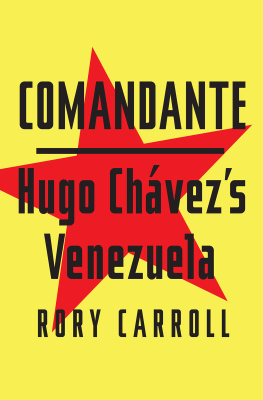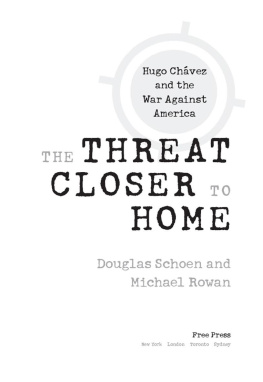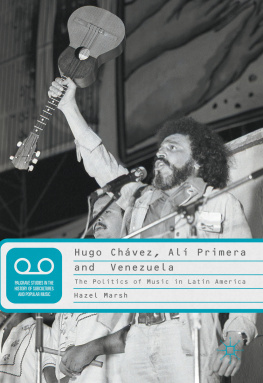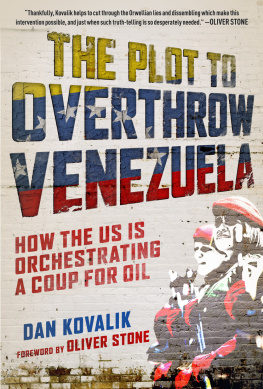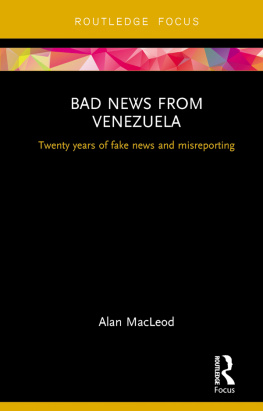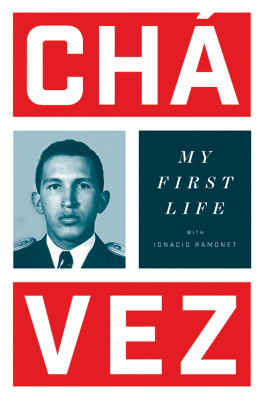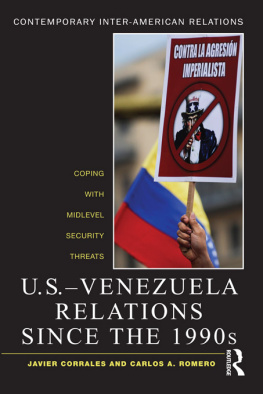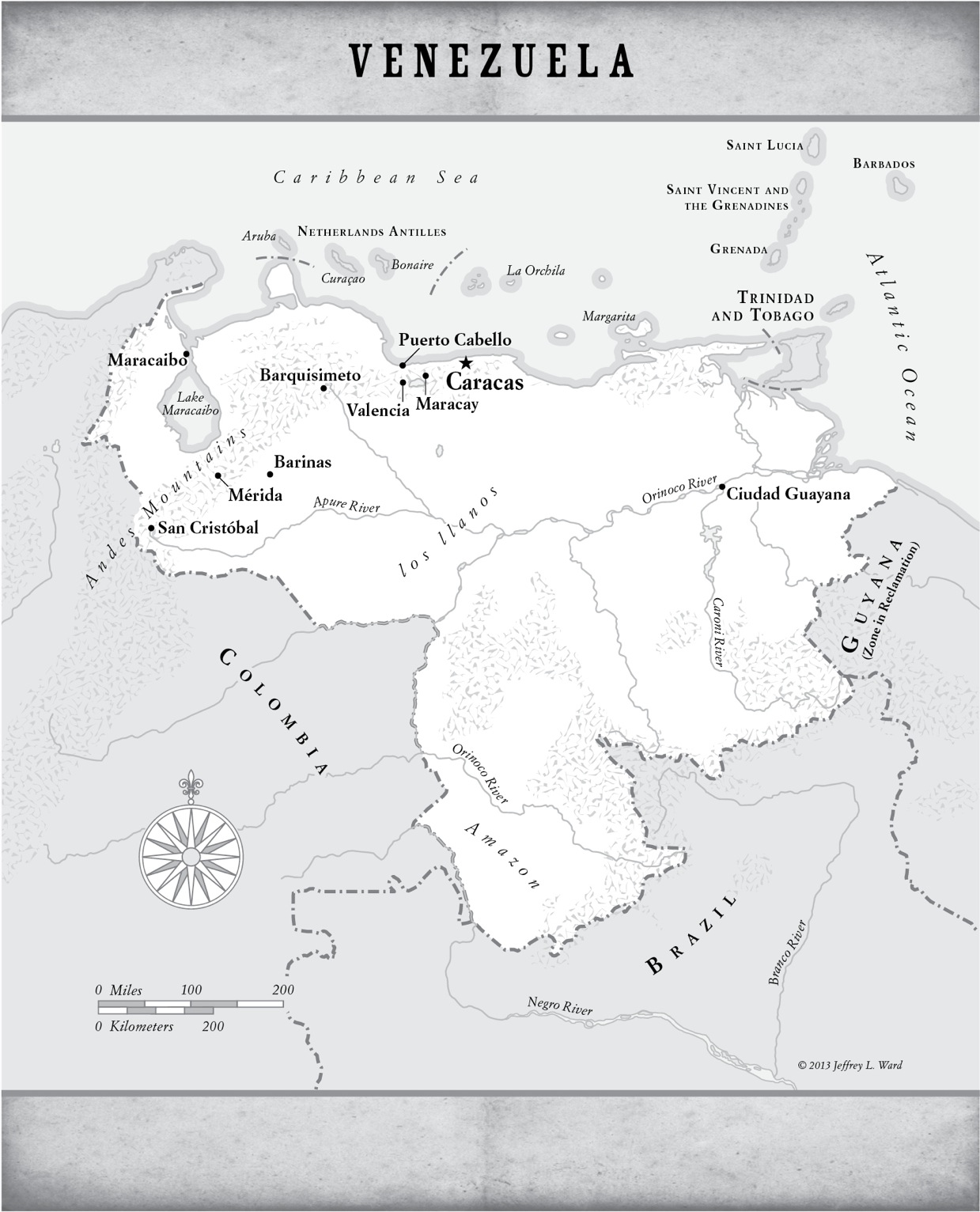THE PENGUIN PRESS
Published by the Penguin Group
Penguin Group (USA) Inc., 375 Hudson Street,
New York, New York 10014, USA
USA Canada UK Ireland Australia New Zealand India South Africa China
Penguin Books Ltd, Registered Offices:
80 Strand, London WC2R 0RL, England
For more information about the Penguin Group visit penguin.com
First published in 2013 by The Penguin Press,
a member of Penguin Group (USA) Inc.
Copyright Rory Carroll, 2013
All rights reserved. No part of this book may be reproduced, scanned, or distributed in any printed or electronic form without permission. Please do not participate in or encourage piracy of copyrighted materials in violation of the authors rights. Purchase only authorized editions.
Photograph credits
: Reuters / Miraflores Palace / handout
LIBRARY OF CONGRESS CATALOGING IN PUBLICATION DATA
Carroll, Rory.
Comandante : myth and reality in Hugo Chvezs Venezuela / Rory Carroll.
p. cm.
Includes bibliographical references and index.
ISBN 978-1-101-60579-0
1. Chvez Fras, Hugo. 2. PresidentsVenezuela. 3. VenezuelaPolitics and government1999 4. VenezuelaForeign relations1999 I. Title.
F2329.22.C54C27 2013
987.06'42092dc23
[B]
2012039514
For Ligi, for my parents, Kathy and Joe, and in memory of Heidi Holland
CONTENTS
Acknowledgments
I didnt know it at the time, but this book began upon my arrival in Venezuela in September 2006. I was a correspondent for the Guardian and found an apartment in Caracas, my new home after a decade covering Africa, Iraq, and the Mediterranean. Caracas was to be a base for covering Latin America, but the best story was on my doorstep. On trips to Colombia, Cuba, Mexico, Haiti, and elsewhere, my mind would wander back to Venezuela and its unfolding revolution. When I returned, I would catch up with interviews and reporting trips, talking to street vendors, taxi drivers, security guards, housewives, farmers, prisoners, pensioners, professors, palace functionaries, ministers. All told different stories, but all, one way or another, lived in the shadow of the president, Hugo Rafael Chvez Fras. He bestrode society like a colossus, commanding attention, everywhere his voice, his face, his name. It did not matter whether you despised or adored him; you looked. Covering Venezuela was like wandering through a vast, boisterous audience that simultaneously booed and cheered the titan who turned the presidential palace, Miraflores, into a stage.
My notebooks filled and I filed copy to London, but there was never enough scope to capture this experiment by the Caribbean that supporters called el proceso, the process. A laboratory of power and charisma that veered between hope, dread, and farce. There was no capturing that in five-hundred-word news stories. Thus Chvez retained a mystique abroad, depending on partisanship, as a tyrant or a messiah. Cartoonish images. The reality was more complex, strange, and fascinating. Thus was born the idea for this book. By 2012, I had four boxes bulging with notebooks, but they were not enough. I needed to see how Chvez constructed his stage. I needed to get inside the walls of Miraflores. I took six months leave from the Guardian to seek and interview those who had, at one time or another, access to the throne. Aides, ministers, courtiers, bodyguards, supplicants, all played a role in the court of Hugo Chvez. All, in different ways, bore witness. Some spoke eagerly to criticize and settle scores with a ruler they no longer believed in. Others spoke to laud, to eulogize a one-off, a man of unique, unforgettable talents. Others had to be cajoled, or offered anonymity, for fear their testimony would create ructions in what was left of the revolution. Most sources are named. A few are not. To all who spoke, named or not, I am grateful. Private letters from Chvez published in Cristina Marcano and Alberto Barrera Tyszkas excellent 2004 biography helped plug gaps.
I owe a debt to many others: Marianella Garca, my assistant, for her contacts, generosity, and friendship; Virginia Lpez for her ideas, solidarity, and humor. Heidi Holland, Francisco Toro, Brian Ellsworth, Phil Gunson, and Dan Cancel, fonts of expertise, for reading the draft and intercepting blunders; Lolybel Negrin for the transcriptions; Will Lippincott, my agent, for shepherding each step with agility and wisdom; Ginny Smith, Laura Stickney, Ann Godoff, and Scott Moyers at the Penguin Press, and Nick Davies and his team at Canongate, for flair and dedication in turning a manuscript into a book; my colleagues at the Guardian for indulgence and support; my family in Caracas and Dublin for encouragement; and, above all, my wife, Ligi, for her patience, passion, and belief in helping me to write about her country. To all, thank you.
Los Angeles, July 2012
PROLOGUE
I t was approaching midnight when the Venezuelan air force plane climbed over Havana and wheeled south, skimming over a moonlit Caribbean, bound for Caracas. Gabriel Garca Mrquez sat with a pen and notebook next to Hugo Chvez. There was little physical resemblance between the two men. The writer was small, with a white mustache, dark eyebrows, and gray, retreating curls over a lined, alert face. Chvez was not especially tall but was powerfully built, still athletic, with cropped black hair, a hatchet nose, and a smooth, dark complexion. Standing next to him, Garca Mrquez resembled a gnome. Seated and buckled, however, they shrank to more equal dimensions.
Both men had been guests of Fidel Castro. Cubas old fox had taken close interest in the Venezuelan, and now it was the turn of the Nobel laureate. It was January 1999, and Chvez was returning to his homeland to be sworn in as president. He had won an election a few weeks earlier and was now set, at forty-four, to become the republics youngest leader. A Colombian magazine had commissioned Garca Mrquez to write a profile. Before finding fame as a novelist, Gabo, as friends called him, had been a newspaper reporter and still had a newsmans instinct to interview and probe. We had met three days earlier in Havana, he subsequently wrote. The first thing that impressed me was his body of reinforced concrete. He had an immediate friendliness and a homegrown charm that were unmistakably Venezuelan. We both tried to meet up again, but it was not possible for either of us, so we decided to fly together to Caracas so we could chat about his life and other miracles.
Chvez had yet to take office, and already his rise seemed extraordinary. Venezuela had once been considered South Americas most successful and therefore boring country, a realm of oil wealth and beauty queens that sat out the regions cold-warera dictatorships and revolutions in a haze of petrodollar complacency and bloodless elections. That changed one explosive night in February 1992 when an unknown lieutenant colonel named Hugo Chvez attempted a coup and sent tanks and soldiers with camouflage-painted faces to assault the presidential palace, Miraflores. President Carlos Andrs Prez escaped, the coup failed, and Chvez went to jail, but six years later he stormed back as an election candidate, swept aside rivals, and here he was, president-to-be, flying beneath the stars to an unwritten fate. Who was this man?

